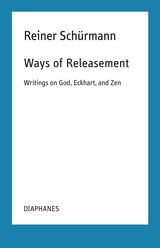162 books about Asian American & Pacific Islander and 7
start with L
162 books about Asian American & Pacific Islander and 7
162 books about Asian American & Pacific Islander
7 start with L start with L
7 start with L start with L
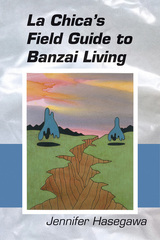
La Chica's Field Guide to Banzai Living
Jennifer Hasegawa
Omnidawn, 2019
From the small towns strung along the coast of the Big Island of Hawai‘i to the land-locked landscapes of Paraguay to the volcanic surface of Venus, this collection of poetry is a field guide to flora, fauna, and mineralia encountered, real, and imagined. Jennifer Hasegawa scans across physical and mental planes to reveal their inhabitants. Packed tightly into exploratory rocket segments, these poems ignite our gravest flaws to send our grandest potentials into orbit.
Hasegawa’s poems not only rearrange our ways of seeing the world, but they also reset the language we use in it. Banzai, with a literal translation of “10,000 years,” was used by the Japanese as a rallying cry in imperialistic and militaristic contexts. Today, the understanding of this word has shifted to a comparatively neutral translation of the enthusiastic expression “Hurrah!” in both in Japan and beyond. In La Chica’s Field Guide to Banzai Living, Hasegawa aims to reclaim banzai, recasting the language of war and unwavering loyalty and forming it into one that stands against aggression and racism and embraces tolerance and self-acceptance. Here banzai becomes a rallying cry not of war but of grand potential. La Chica’s Field Guide to Banzai Living chronicles a celebratory life and poetry filled with wonder.
Hasegawa’s poems not only rearrange our ways of seeing the world, but they also reset the language we use in it. Banzai, with a literal translation of “10,000 years,” was used by the Japanese as a rallying cry in imperialistic and militaristic contexts. Today, the understanding of this word has shifted to a comparatively neutral translation of the enthusiastic expression “Hurrah!” in both in Japan and beyond. In La Chica’s Field Guide to Banzai Living, Hasegawa aims to reclaim banzai, recasting the language of war and unwavering loyalty and forming it into one that stands against aggression and racism and embraces tolerance and self-acceptance. Here banzai becomes a rallying cry not of war but of grand potential. La Chica’s Field Guide to Banzai Living chronicles a celebratory life and poetry filled with wonder.
[more]
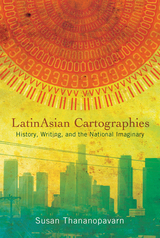
LatinAsian Cartographies
History, Writing, and the National Imaginary
Thananopavarn, Susan
Rutgers University Press, 2018
LatinAsian Cartographies examines how Latina/o and Asian American writers provide important counter-narratives to the stories of racial encroachment that have come to characterize twenty-first century dominant discourses on race. Susan Thananopavarn contends that the Asian American and Latina/o presence in the United States, although often considered marginal in discourses of American history and nationhood, is in fact crucial to understanding how national identity has been constructed historically and continues to be constructed in the present day.
Thananopavarn creates a new “LatinAsian” view of the United States that emphasizes previously suppressed aspects of national history, including imperialism, domestic racism during World War II, Cold War operations in Latin America and Asia, and the politics of borders in an age of globalization. LatinAsian Cartographies ultimately reimagines national narratives in a way that transforms dominant ideas of what it means to be American.
Thananopavarn creates a new “LatinAsian” view of the United States that emphasizes previously suppressed aspects of national history, including imperialism, domestic racism during World War II, Cold War operations in Latin America and Asia, and the politics of borders in an age of globalization. LatinAsian Cartographies ultimately reimagines national narratives in a way that transforms dominant ideas of what it means to be American.
[more]
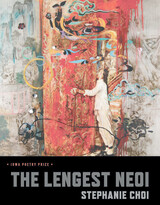
The Lengest Neoi
Stephanie Choi
University of Iowa Press, 2024
The Lengest Neoi embraces and complicates what it means to err—to wander or go astray; a deviation from a code of behavior or truth; a mistake, flaw, or defect. Beginning with the collection’s title, which combines a colloquial Cantonese phrase (Leng Neoi / “Pretty Girl”) and the English suffix for the superlative degree (—est), these poems wander, deviate, and flow across bodies, geographies, and languages. In this collection from Stephanie Choi, you’ll find the poet’s “tongue writing herself, learning to speak.”
[more]
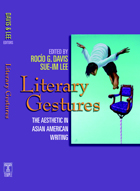
Literary Gestures
The Aesthetic in Asian American Writing
edited by Rocío G. Davis and Sue-Im Lee
Temple University Press, 2005
Literary Gestures: The Aesthetic in Asian American Writing contests the dominance of materialist and cultural critiques in Asian American literary discourse by re-centering critical attention around issues of aesthetics and literary form. Collapsing the perceived divisions between the "ethnic" and the "aesthetic" in Asian American literary criticism, the eleven original essays in this volume provide theoretically sophisticated and formally sensitive readings of works in prose, poetry, and drama. These contributions bring discussions of genre, canonicity, narrative, and literary value to the fore to show how aesthetic and formal concerns play an important part in the production and consumption of these works. By calling for a more balanced mode of criticism, this collection invites students and scholars to reinvest in the literary, not as a negation of the sociopolitical, but as a complementary strategy in reading and understanding Asian American literature.
[more]
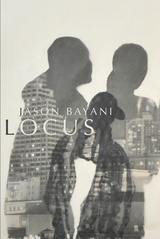
Locus
Jason Bayani
Omnidawn, 2019
Life in a multicultural, multiethnic nation like the United States leads to complicated, sometimes fragmented experiences of our background and identity. In Locus, Jason Bayani’s poetry explores the experience of identity that haunts Pilipinx-Americans in the wake of the 1965 Hart-Celler Immigration Act, a critical moment left out of most histories of Asian-American life in the United States. Bayani’s poetry seeks to recuperate this silenced experience, rendering the loss of memory migration entails and representing the fragments of cultural history that surface in a new national context. Drawing inspiration from the mixing and layering of musical fragments in DJ culture, Locus lays down tracks of memory to create a confident declaration of a distinctly Pilipinx-American voice, history, and artistic power. Indeed, his work reveals how these new creations often tie us to the most fundamental parts of ourselves: our families, our cultures, the vague memories passed down through generations.
In Locus, Bayani both renders the challenges of migration and captures an experience of selfhood and history, asserting a central place for migrant identity and experience in American culture.
[more]
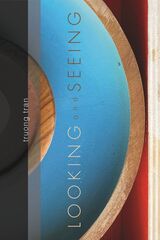
Looking and Seeing/Seeing and Looking
Damon Potter and Truong Tran
Omnidawn, 2023
Two books bound together that interrogate race—one from the perspective of a man of color, and the other from the perspective of a white man.
This book brings together different perspectives under two titles, considering the lives and experiences of two friends, one Vietnamese American and one white. Looking And Seeing is a poetic work of yearning, regret, and righteous indignation. In Truong Tran’s poetry, what is said and what is written reveal our complexities. Composed as an investigation of his own being and body as a brown person moving through white spaces, this collection moves alongside Tran’s friend and collaborator Damon Potter. Seeing and Looking offers a record of Potter’s perspective as a white man examining who he is and wants to be and the complications of trying to be good while also benefiting from histories of oppression. Potter considers death—both his own future death and the deaths of his friends—while grappling with how to witness horrors, wonders, and his self.
This book brings together different perspectives under two titles, considering the lives and experiences of two friends, one Vietnamese American and one white. Looking And Seeing is a poetic work of yearning, regret, and righteous indignation. In Truong Tran’s poetry, what is said and what is written reveal our complexities. Composed as an investigation of his own being and body as a brown person moving through white spaces, this collection moves alongside Tran’s friend and collaborator Damon Potter. Seeing and Looking offers a record of Potter’s perspective as a white man examining who he is and wants to be and the complications of trying to be good while also benefiting from histories of oppression. Potter considers death—both his own future death and the deaths of his friends—while grappling with how to witness horrors, wonders, and his self.
[more]

Lucky Fish
Aimee Nezhukumatathil
Tupelo Press, 2011
Poetry. Asian American Studies. LUCKY FISH travels along a lush current—a confluence of leaping vocabulary and startling formal variety, with upwelling gratitude at its source: for love, motherhood, "new hope," and the fluid and rich possibilities of words themselves. With an exuberant appetite for "my morning song, my scurry-step, my dew," anchored in complicated human situations, this astounding young poet's third collection of poems is her strongest yet.
[more]
READERS
Browse our collection.
PUBLISHERS
See BiblioVault's publisher services.
STUDENT SERVICES
Files for college accessibility offices.
UChicago Accessibility Resources
home | accessibility | search | about | contact us
BiblioVault ® 2001 - 2024
The University of Chicago Press






